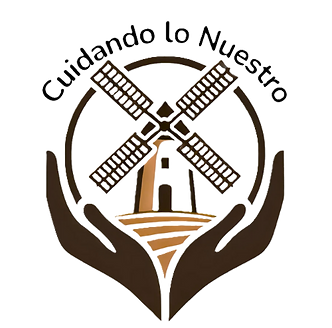
COURSE:
SUSTAINABLE SCHOOLS: BUILDING A GREEN FUTURE
PROGRAM

1st day, Monday. Place: Antigua
Inauguration and welcome to the participants
Sustainability in the Landscape.
Fuerteventura, Biosphere Reserve, a fragile, complex and very vulnerable territory. “School gardens” project ecological”. Visit to an ecological school garden
The Circular Economy. Visit to a gofio mill and local cheese museum.
Lunch included
2nd day, Tuesday. Place: Gran Tarajal
Marine ecosystems.
Fauna and Flora of the Fuerteventura coast.
Microplastics in our marine environment. Raising awareness against plastic dumping to the sea. Island consciousness. Practical workshop in the beach
Visit to a secondary school
3rd day, Wednesday. Place: Pájara
The geology of our coasts.
Training geological with more than 100 million years is the oldest geological formation in the Canary Islands
Sustainable Art.
The utilization of pieces and residues of iron in the manufacturing of sculptural pieces for purposes artistic. Dialogue with the artist. The local sculptor Juan Miguel Cubas
Visit to the Ajuy Caves.
4th day, Thursday. Place: Puerto Rosario
The importance of recycling in a world with limited resources.
Used clothing recycling workshop development of smart textiles.
Working on STEAM (Science, technology, engineering, art and mathematics)
Artificial Intelligence for a Sustainable Learning.
AI gives us provides tools for the generation of new knowledge, promoting intergenerational commitment in digital transformation of education, encouraging
Visit Art School of Fuerteventura
Lunch and farewell. Delivery of certificates






FUERTEVENTURA ISLAND, BIOSPHERE RESERVE
Course summary
This course is structured from an ecosocial approach, promoting connection with the environment and developing in students a sense of belonging to the planet that welcomes us and needs us for its conservation. To take care of our environment, we must first know the functioning of our ecosystems; To value our natural and cultural heritage through observation and experimentation, we must seek the link with nature from our local reality to the global reality. Environmental education guarantees us a more harmonious, kinder and more lasting present and future, in accordance with the Sustainable Development Goals and the 2030 Agenda for sustainable development.
The course will take place in a Biosphere Reserve, the island of Fuerteventura, a fragile, complex and very vulnerable territory. An Island whose ecosystems and landscapes are extremely fragile and are subject to increasing human pressure; which has created greater community awareness in the protection of its landscape and heritage values. This awareness is reflected in projects to promote and maintain an informed, aware, participatory and involved community in the development of its environment at all levels. This course takes this island journey and shares it with all European teachers to outline a greener, more inclusive, kinder, more harmonious and respectful Europe with the natural environment and its inhabitants, in accordance with the New European Bauhaus
Learning outcomes
At the end of the course, participants will be able to:
■ Introduce the principles of environmental education and outdoor education in their school from an ecosocial perspective
■ Collect data on the impact of human activity on the environment and plan how to mitigate it
■ Appreciate and promote nature in different environments: natural, tourist, landscape, urban, rural, marine, etc.
■ Plan environmental awareness campaigns related to 1 protection of the sea, cultivation of the land and observation and protection of the quality of the sky.
■ Pose and develop practical environmental projects in their educational centers related to recycling, waste management, the elimination of plastic and the promotion of Km0 consumption.
TARGET AUDIENCE
This course is aimed at teachers, training staff, guidance staff, school management and administration who work in primary schools, secondary schools, vocational schools, training centers, adult education institutions, kindergartens and preschools, educational institutions. higher education and NGOs.
PROGRAM
Our program consists of 4 days of course in the morning, with extra activities of voluntary participation. In addition, two lunches are offered with the course and visits to places of interest.
METHODOLOGY
The work methods are eminently practical and participatory, although tries to adapt to the needs, attitudes and professional profiles of people participants. In this way, extrapolated learning tools are offered.
to other realities, other countries and other natural, heritage and cultural.
The pedagogical methodology is based on experiential training, in workshops practical where teachers participate and experiment in an immersive environment in full nature within a framework as unique as the Biosphere Reserve of Fuerteventura..
The exchange of good practices is encouraged, including visits to schools and local institutions that allow participants to better understand the system local education, as well as exchanging ideas and contacts
Planned dates
Adapted to the group
Course language
The course is taught in English
Erasmus+ costs and financing
Our pricing policy follows the official regulations on transparent costs. The costs can be financed by a KA grant under the program
Erasmus+.
Course price: 320 euros per participant (4-day course).
Certification and validation of learning outcomes
At the end of the course, each participant will be given a document accrediting course attendance.
Organized by: Social and Cultural Association "Cuidando lo Nuestro"
Mail: info@cuidandolonuestro.org
Address: C/ La Corte. Antigua. CP 35638. Fuerteventura
Web page: https://www.cuidandolonuestro.org
■ Design heritage routes in historical and natural environments of their cities.